

The reason Zoom calls drain your energy - BBC Worklife. Big group calls can feel particularly performative, Petriglieri warns.
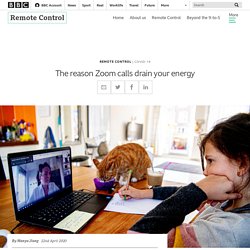
People like watching television because you can allow your mind to wander – but a large video call “is like you're watching television and television is watching you”. Large group chats can also feel depersonalising, he adds, because your power as an individual is diminished. And despite the branding, it may not feel like leisure time. “It doesn't matter whether you call it a virtual happy hour, it's a meeting, because mostly we are used to using these tools for work.”
Free Reference Manager & Citation Generator. How Can I Share It. SenseMaker® - Cognitive Edge. Pulses are the next evolution of our powered-by-Sensemaker Scans.
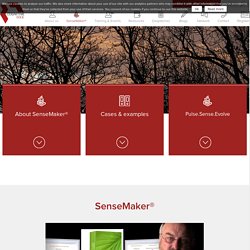
Pulses bring you a preconfigured off-the shelf SenseMaker® Online service that offer easy to use collection of narrative data around specific topics. Currently, we have Pulses available for: Even After His Death, Paul Allen Continues To Make An Impact, This Time With Social Entrepreneurs. One of the first investments that billionaire Paul Allen's investment arm Vulcan Capital has made since his death is in a fund that will invest in social entrepreneurs in places like Africa and South America.
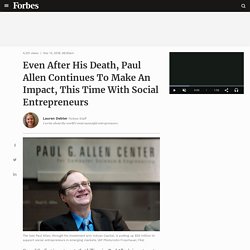
On Tuesday, Capria Fund announced that Vulcan Capital was the largest investor in a $100 million fund that will make impact investments -- which aim to produce both financial and social or environmental returns -- in the emerging markets. Allen, the Microsoft cofounder who died from complications of non-Hodgkin's lymphoma at age 65 in October, had informally agreed to invest in the fund through his Vulcan Capital at the beginning of the year. Children are being ‘datafied’ before we’ve understood the risks, report warns. Axial Shift: The Decline of Trump, the Rise of the Greens, and the New Coordinates of Societal… Yesterday’s midterm election results demonstrate that the United States continues to be divided and moving to the extremes of left and right.
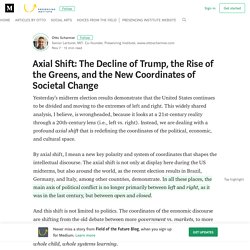
This widely shared analysis, I believe, is wrongheaded, because it looks at a 21st-century reality through a 20th-century lens (i.e., left vs. right). Instead, we are dealing with a profound axial shift that is redefining the coordinates of the political, economic, and cultural space. By axial shift, I mean a new key polarity and system of coordinates that shapes the intellectual discourse. The axial shift is not only at display here during the US midterms, but also around the world, as the recent election results in Brazil, Germany, and Italy, among other countries, demonstrate. With or Without EU? This report considers the contribution that EU migrants make to urban economies in England and Wales, and the impact that post-Brexit changes to migration policy could have in cities.
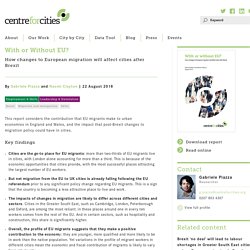
Key findings Cities are the go-to place for EU migrants: more than two-thirds of EU migrants live in cities, with London alone accounting for more than a third. This is because of the economic opportunities that cities provide, with the most successful places attracting the largest number of EU workers.But net migration from the EU to UK cities is already falling following the EU referendum prior to any significant policy change regarding EU migrants. This is a sign that the country is becoming a less attractive place to live and work.The impacts of changes in migration are likely to differ across different cities and sectors. Recommendations. Bloom Impact - A Financial Services Marketplace. CTOs for Good – Let's do more good, not reinvent wheels.
WALUBENGO: Why local funding is critical for ICT projects. By JOHN WALUBENGOMore by this Author Chinese billionaire Jack Ma recently committed $10 million to funding tech entrepreneurs across Africa.
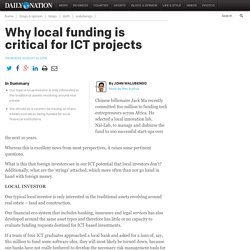
He selected a local innovation lab, Nai-Lab, to manage and disburse the fund to 100 successful start-ups over the next 10 years. Whereas this is excellent news from most perspectives, it raises some pertinent questions. What is this that foreign investors see in our ICT potential that local investors don’t? Additionally, what are the ‘strings’ attached, which more often than not go hand in hand with foreign money. Our typical local investor is only interested in the traditional assets revolving around real estate – land and construction. Our financial eco-system that includes banking, insurance and legal services has also developed around the same asset types and therefore has little or no capacity to evaluate funding requests destined for ICT-based investments. IndiKit. IndiKit was developed by the Czech INGO People in Need (PIN).
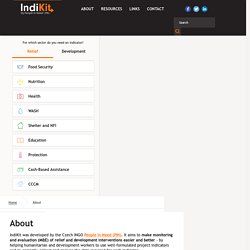
It aims to make monitoring and evaluation (M&E) of relief and development interventions easier and better - by helping humanitarian and development workers to use well-formulated project indicators and to correctly collect and analyse the data required for each indicator. IndiKit does not intend to cover an exhaustive list of indicators - its primary focus is on those indicators whose use requires more detailed guidance. PIN has done its best to ensure that this guidance is methodologically correct, useful and concise.
IndiKit's content is aligned to existing sector standards and was reviewed by M&E and technical specialists from the non-government organizations, Global Clusters, UN agencies and universities. 2 Organizational Culture EN.